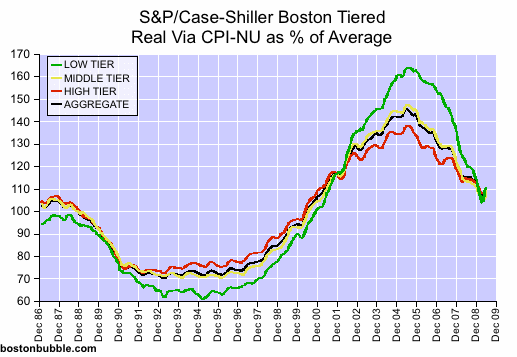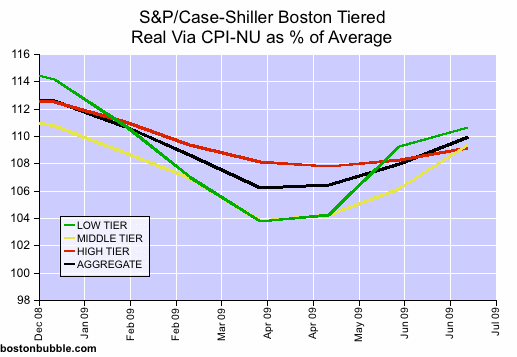 |
bostonbubble.com
Boston Bubble - Boston Real Estate Analysis
|
|
SPONSORED LINKS
Advertise on Boston Bubble
Buyer brokers and motivated
sellers, reach potential buyers.
www.bostonbubble.com
YOUR AD HERE
|
|
DISCLAIMER: The information provided on this website and in the
associated forums comes with ABSOLUTELY NO WARRANTY, expressed
or implied. You assume all risk for your own use of the information
provided as the accuracy of the information is in no way guaranteed.
As always, cross check information that you would deem useful against
multiple, reliable, independent resources. The opinions expressed
belong to the individual authors and not necessarily to other parties.
|
| View previous topic :: View next topic |
| Author |
Message |
GenXer
Joined: 20 Feb 2009
Posts: 703
|
 Posted: Fri Aug 28, 2009 3:03 pm GMT Post subject: Posted: Fri Aug 28, 2009 3:03 pm GMT Post subject: |
 |
|
| Some of the greatest 'sucker' rallies happened during Depressions/recessions. What does it mean? Absolutely positively NOTHING. If we try to predict the future by a rising (or falling) stock/price chart, we will always be wrong, unless we happen to guess correctly (a pretty slim chance for that exists). The only thing we know is that macro fundamentals are crap and getting worse if anything. There is really no way it can be spun to prove that the bottom is here. If anything, calling bottoms is near impossible, and amounts to making pretty random guesses about the future movement of the economy. |
|
| Back to top |
|
 |
admin
Site Admin
Joined: 14 Jul 2005
Posts: 1826
Location: Greater Boston
|
 Posted: Fri Aug 28, 2009 5:00 pm GMT Post subject: Posted: Fri Aug 28, 2009 5:00 pm GMT Post subject: |
 |
|
| admin wrote: |
Ignoring the complicating factors for a moment, not only would the S&P/Case-Shiller Index be better, but you could use the tiered version to see more precisely whether the month over month uptick was most pronounced in the low, middle, or high tier. My guess is that the $8K credit would have the most effect on the low tier and that the financial crisis would have the the most effect on the high tier. I'd graph this out if I had time, but I probably won't anytime soon.
|
I had time after all. The uptick is very pronounced in the low tier and practically absent in the high tier. I think this is strong evidence in support of the hypothesis that the somewhat larger than usual spring bounce is largely a result of the temporary tax credit.
- admin

 |
|
| Back to top |
|
 |
mpr
Joined: 06 Jun 2009
Posts: 344
|
 Posted: Sat Aug 29, 2009 3:02 am GMT Post subject: Posted: Sat Aug 29, 2009 3:02 am GMT Post subject: |
 |
|
| GenXer wrote: | | Some of the greatest 'sucker' rallies happened during Depressions/recessions. What does it mean? Absolutely positively NOTHING. If we try to predict the future by a rising (or falling) stock/price chart, we will always be wrong, unless we happen to guess correctly (a pretty slim chance for that exists). The only thing we know is that macro fundamentals are crap and getting worse if anything. There is really no way it can be spun to prove that the bottom is here. If anything, calling bottoms is near impossible, and amounts to making pretty random guesses about the future movement of the economy. |
In a way this argument is analogous to Greenspan's assertion that
one cant spot a bubble until after its happened.
There is certainly no way to *prove* we have (or haven't) hit a bottom
until well after the event, but I dont agree its completely fruitless to
discuss the macro fundamentals, and what that might mean. |
|
| Back to top |
|
 |
mpr
Joined: 06 Jun 2009
Posts: 344
|
 Posted: Sat Aug 29, 2009 3:17 am GMT Post subject: Posted: Sat Aug 29, 2009 3:17 am GMT Post subject: |
 |
|
| admin wrote: |
I had time after all. The uptick is very pronounced in the low tier and practically absent in the high tier. I think this is strong evidence in support of the hypothesis that the somewhat larger than usual spring bounce is largely a result of the temporary tax credit.
- admin
|
I have to admit that the tiered graph is pretty interesting, and certainly
some evidence that the $8K credit is having more of an effect than
I might be giving it credit for.
The problem with saying anything definitive is that there are
other significant reasons which might effect these trends in the same way.
One, which you mentioned is FHA loans which have a cap on the amount
($410 K max loan amount). Another is that jumbo loans have become
incredibly hard to get and were even more difficult to get earlier this year.
So there are also non-temporary factors favoring the lower tiers. |
|
| Back to top |
|
 |
BostonObserver
Joined: 09 May 2009
Posts: 8
|
 Posted: Sun Aug 30, 2009 8:19 pm GMT Post subject: Re: you all waited too long... Posted: Sun Aug 30, 2009 8:19 pm GMT Post subject: Re: you all waited too long... |
 |
|
Regarding the assertions made below, the devil is in the details... check out the YoY sales data in the table found here:
http://seekingalpha.com/article/158901-mixed-housing-data-clearing-up-the-picture
Granted, the data refers to % change in unit sales levels (not price change) but the message is quite interesting nonetheless.
Homes priced under $250,000 seem to be where the turnaround is taking place -- can you even buy a SFH for <$250,000 in Boston?
| Anonymous wrote: | Not sure if you've have noticed the news lately? Check out the lead news artcile on cnnmoney. All of you that keep sitting and waiting and waiting and waiting to buy trying to time the market have waited too long. Prices are gowing up everywhere. Keep waiting and waiting and you will keep losing and losing. Other than unemployment, which has slowed tremendously and will eventually level out at normal levels in the near future (early 2010) housing will make a comeback. Not like it has in the nmost recent past (2004-2005 levels) but it will come back just like the stock market. All of you who sat on the sidelines have sat too long. Here is the article to read for yourself.
http://money.cnn.com/2009/08/26/real_estate/July_new_home_sales/index.htm?postversion=2009082612
Title of Article: New home sales blast past expectations |
|
|
| Back to top |
|
 |
GenXer
Joined: 20 Feb 2009
Posts: 703
|
 Posted: Mon Aug 31, 2009 12:14 pm GMT Post subject: Posted: Mon Aug 31, 2009 12:14 pm GMT Post subject: |
 |
|
See if this works. At the start of the week, note the Dow's price. Try to predict what it will be in 1,5,10,15,20 days. Do that at the start of every week. See how close you can get. You need to analyze the data right, because there may not be statistically significant difference on the order of days, but there certainly is on the order of weeks and months, and certianly years. Its just that days/weeks are much easier to test and to accumulate statistical data on guesses vs. the actual price. I propose that the longer ahead you try to guess, the more wrong you will be. This is a simple result of a classical Random Walk model. While being totally wrong simply because it does not allow for deviations much larger than several sigma, but even if we take this model for the stock market, (keeping in mind that deviations are much larger, leading to a much larger impact (or a possible future deviation), we can see mathematically that the longer you try to predict ahead, the more wrong you will be.
Such predictions will amount to nothing more than guesses. While for the classical Random Walk model you can bound your prediction by confidence interval, no such thing is possible for the actual stock market, and larger moves simply amplify this effect, so that long term it is impossible to predict the behavior of the market.
Real estate index, while NOT exactly the stock market is more akin to bond market. While bond market is NOT as extreme as the stock market, it is nevertheless extreme enough to ditch the Random Walk model. So in other words, even Treasuries are volatile enough so that any predictions as far as 6 months ahead will miss the mark. Granted, you can get close by chance, but the more times you do it, the more likely you are to be wrong. Yes, you can guess right several times in a row, but that does not come from superior analytical skills. If you practice your prediction skills with any economic quantity which behaves as a random process you will see that your prediction ability based on 'fundamentals' is nothing more than wild guesses, which only appear to be based on 'data'. There is simply too much data, and the economic variables respond very quickly to big changes which are impossible to predict, and which can be analyzed only in the hindsight.
So, my usual suggestion - don't take yourself too seriously trying to predict the future, and don't bet your savings on it (i.e. by trying to call bottoms when we know we do not have the ability to do so without incurring a lot of unnecessary risk). |
|
| Back to top |
|
 |
|
|
You can post new topics in this forum
You can reply to topics in this forum
You cannot edit your posts in this forum
You cannot delete your posts in this forum
You cannot vote in polls in this forum
|
Forum posts are owned by the original posters.
Forum boards are Copyright 2005 - present, bostonbubble.com.
Privacy policy in effect.
Powered by phpBB © 2001, 2005 phpBB Group
|




